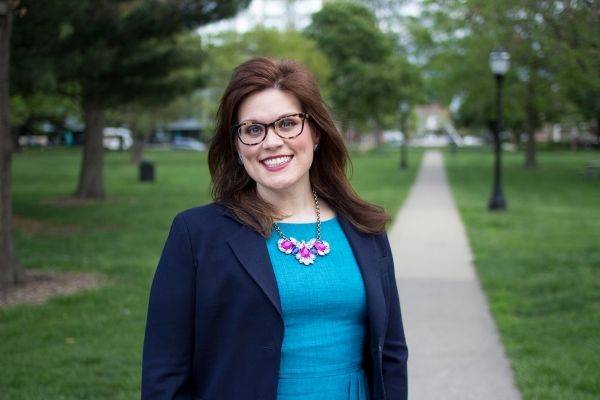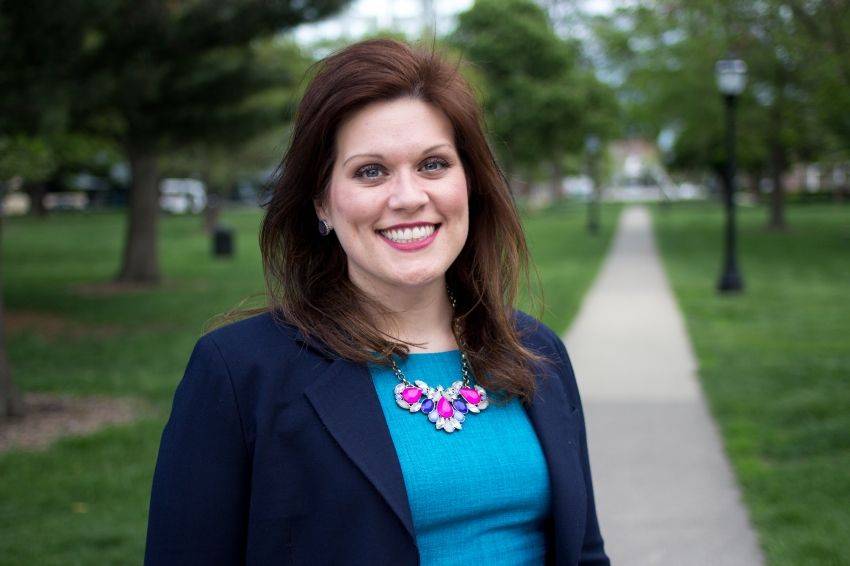Kristin Williamson, Republican candidate for State Representative in the 103rd District, is from Effingham originally and came to Champaign-Urbana for school twelve years ago (Parkland originally, then the University of Illinois). She now lives in Urbana and works as the Director of Public Relations for Benefit Planning Consultants, Inc.
On a recent Sunday afternoon, she took time off from knocking on voters’ doors to talk with me about her campaign. I asked her about a number of topics and she seemed happy to discuss whatever issue came up — from MAP grants to gambling casinos to climate change.
Although this is her first major campaign, Williamson said that political interest and involvement are nothing new to her:
Politics is something that I’ve always been into, even when I was a teenager. I had grandparents who were very engaged in the issues and I was around that growing up. I like to meet new people and collaborate on how we [can] find solutions to problems until we find the right one. Since moving to Champaign-Urbana, many of the opportunities I’ve had to learn and get involved came through politics. When I was at Parkland, I was on the student government and was involved in some local issues. So politics has been a way I’ve been able to give back.
I asked Williamson what she would do if she ever faced a dilemma similar to what Naomi Jakobsson faced on the recent Pension Reform Bill: having to choose between what her party wanted and what her constituents wanted. She replied:
I think that the individual who represents this community is beholden to the people who elect her to go to Springfield to work on their behalf. Champaign-Urbana has a higher concentration of government employees than any other district. The University of Illinois is the economic engine of our community, and I believe that whoever represents us in Springfield has to put those interests first.
I spoke with Williamson just after Governor Quinn gave his Budget Address, and asked her for her reaction. She said:
I was quite frustrated with the governor’s address. The week prior, the message he was sending to communities like ours, that have a larger proportion of government institutions, was that ‘we’re going to have to make drastic cuts or shutter the doors if we don’t extend the tax increase,’ but then the day he gave the address, it was, ‘We’re going to extend the tax increase and we suddenly have so much money that we can introduce new programs with new spending estimated to be $1.7 billion.’ I really don’t think that either of those solutions are the state’s paths to prosperity. There needs to be a balance. I think what we really have to do is figure out how we can pay our bills and restore some confidence in our state’s fiscal and political climate to reassure people who want to come here and invest in new jobs here.
Just to throw in a controversial social issue, I asked Williamson to give her thoughts on marriage equality. She supports gay marriage, in part because—as a single mother herself—she feels that she isn’t one to judge:
I’m open-minded in the sense that I look at people and try to understand [where] everyone is coming from. As far as gay marriage, I look at [it] as: ‘Who am I to decide how someone else should live their life?’ And my son and I … our family doesn’t necessarily look like other families, and that’s O.K. I walk him to school and see that so many families there look different. For me not to support gay marriage, that would send the wrong message to my son. I have to consider my constituency and what is the right thing to do.
 I asked Williamson what kind of bills she sees herself being the primary sponsor for, if elected. She told me:
I asked Williamson what kind of bills she sees herself being the primary sponsor for, if elected. She told me:
Specifically, education and economic bills. I would likely seek assignments on the Higher Education, Economic Development, and Transportation committees. We here in Champaign-Urbana should be leading the conversation on those issues.
On the subject of researching issues on her own, Williamson explained her approach:
It usually depends on where in the matter we are. When I hear about a new bill that’s coming down the pike, I always start with the raw text and look at it objectively. And then I look at who I should reach out to from there to find out their opinion or viewpoint—maybe someone from local labor, someone from the University, someone from the business community. I try to get a diverse selection. It’s important to talk to the people it really impacts.
Wondering what she thought about a global issue, I asked Williamson if she thought climate change was real. She replied:
I certainly believe, from what the studies suggest, that climate change is real. Whether or not you believe in climate change, I think that it’s up to each of us to make sure we’re taking care of what we’ve been given. There are things that we do to the environment that we don’t get to do over.
In regards to local environmental issues, Williamson told me that she’s against having PCBS dumped at Clinton Landfill:
I think that we have to protect our public water. One of our first and foremost concerns should be protecting the Mahomet Aquifer. I cannot support taking any risks when it comes to our water supply.
On the subject of crime and punishment, and the challenges Illinois faces with its prisons, Williamson said:
Prison overcrowding is a serious concern, and I think it is smart for the legislature to look at ways to modernize minimum sentencing requirements, find alternative solutions for non-violent offenders, and community-based solutions to reduce recidivism rates. But, at the same time, there is too much violence in places, whether it is in parts of Champaign-Urbana or the well-documented violence problems in Chicago. We need to balance keeping streets safe and the men and women who work in our prisons safe as well. Governor Quinn closed prisons after his early release program put violent offenders out on the street. He put people at risk. We have to do a better job.
Also on the subject of prisons, Williamson commented on the legacy of corruption within Illinois’ state government:
I saw a Gallup poll recently that said only 26% of Illinoisans have faith in state government. I think that’s because of some of the corruption we’ve seen through the Blagojevich administration and the Ryan administration. I would start by supporting a couple of different measures. The first is the Yes for Independent Map referendum that stops politicians from picking their voters in the map drawing processes. By allowing a non-partisan commission of citizens to draw fair maps, legislative districts will become more competitive and make it easier for voters to vote out legislators if they are abusing their power. Also, I’m definitely open to the idea of term limits.
On the topic of street crime in southeast Urbana, Williamson said:
I actually live in southeast Urbana, right on the edge of where we hear about a lot of crime. I can tell you that I believe that the Urbana Police Department is doing what they can to keep people safe. We had some crime this winter that happened in our neighborhood, and the police were happy to help us form a neighborhood watch group. I believe they are being proactive and I don’t feel any less safe.
Williamson said on the topic of having more gambling casinos throughout Illinois:
I’m open to gambling casinos, for economic reasons, at places like Danville that are going through extreme economic distress. I think that it would bring a temporary economic reprieve. It’s certainly not a solution, and I think that we have [to look] closely at where we’re placing them and how we’re regulating them just because some of the societal effects they have on families.
She was enthusiastic on the subject of having high-speed rail in Illinois:
I absolutely support the idea of having high-speed rail, especially for economic reasons. Champaign-Urbana would benefit tremendously, primarily because we have so many students who come down here. We have some really great research and economic development going on here, and I think that having high-speed rail would be beneficial to that, as far as people who wanted to work down here.
She’s not in favor of raising the minimum wage at this time:
At this time, I do not support an increase in the minimum wage in Illinois. A recent report from the Federal Congressional Budget Office projected that while 900,000 minimum wage workers would see a slight increase in pay, an estimated 500,000 people may lose their jobs all together as a result of the rate increase. Today, we have an estimate 550,000 unemployed workers in Illinois and a fragile job climate. My fear is that these job losses will be more pronounced in Illinois.
I know what it’s like to work a minimum wage job, and anyone who has knows that $10 an hour is not enough. And if they have kids, they know that two minimum wage jobs are not enough. My focus will be on opening up more doors for training and education that will allow workers to obtain living-wage jobs in an evolving job economy.
On the subject of progressive vs. flat tax in Illinois, she said:
I don’t support the progressive tax. If you look at some of the other states that have transitioned from a flat tax to a progressive graduated tax, it doesn’t have the intended effect. The idea is that you tax the rich people up on the hill, but they find there aren’t enough of those people to make it work. So, it usually includes a tax increase on middle-income people. Some have estimated the graduated tax in Illinois would raise taxes on people making as little as $18,000 a year. Too many people are already having too hard of a time making ends meet. The conversation we need to be having is about how to generate more revenue, but my preference would be ways that we could do it by finding ways to bring more jobs and more opportunities to expand our tax base to have more people paying in.
On a more personal note, I asked Williamson what her favorite book is. She said:
My favorite book is A Moveable Feast, by Ernest Hemingway. It’s kind of an autobiography of the time after the war when he was living in Paris. It’s just fascinating. I love that era of writing, like F. Scott Fitzgerald. I dabble with modern writers, but I haven’t really found one that I like so much.
These days, I read primarily the news and research. I have a hard time finding the time for kicking back and reading fiction.
Photos courtesy of Sam Logan.








